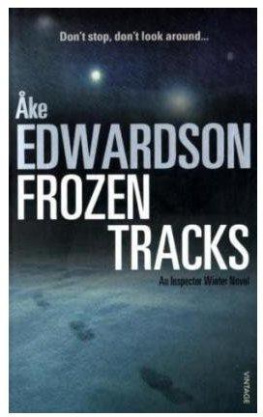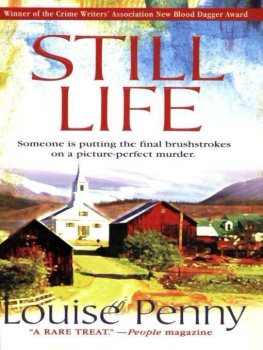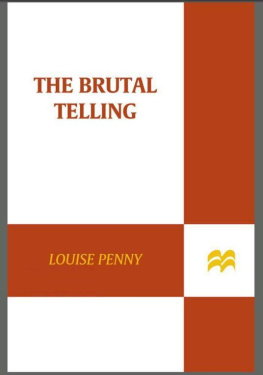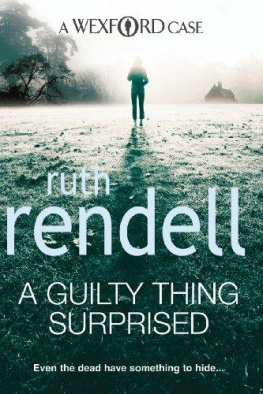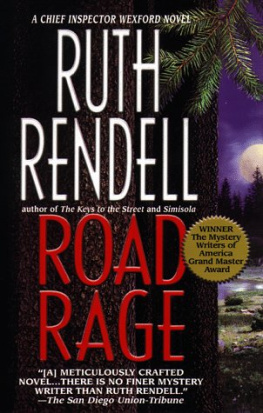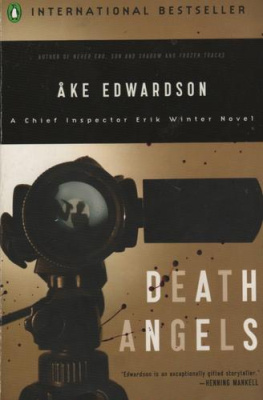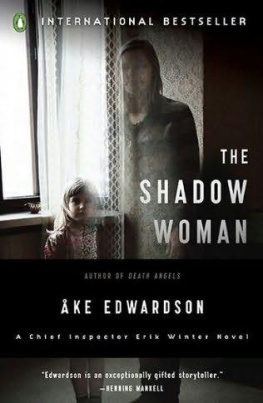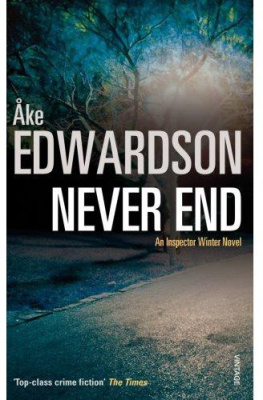Ake_Edwardson - Chief Inspector Erik Winter, Frozen Tracks
Here you can read online Ake_Edwardson - Chief Inspector Erik Winter, Frozen Tracks full text of the book (entire story) in english for free. Download pdf and epub, get meaning, cover and reviews about this ebook. year: 2008, publisher: NewYork:PenguinBooks,2008, genre: Detective and thriller. Description of the work, (preface) as well as reviews are available. Best literature library LitArk.com created for fans of good reading and offers a wide selection of genres:
Romance novel
Science fiction
Adventure
Detective
Science
History
Home and family
Prose
Art
Politics
Computer
Non-fiction
Religion
Business
Children
Humor
Choose a favorite category and find really read worthwhile books. Enjoy immersion in the world of imagination, feel the emotions of the characters or learn something new for yourself, make an fascinating discovery.
- Book:Chief Inspector Erik Winter, Frozen Tracks
- Author:
- Publisher:NewYork:PenguinBooks,2008
- Genre:
- Year:2008
- Rating:4 / 5
- Favourites:Add to favourites
- Your mark:
- 80
- 1
- 2
- 3
- 4
- 5
Chief Inspector Erik Winter, Frozen Tracks: summary, description and annotation
We offer to read an annotation, description, summary or preface (depends on what the author of the book "Chief Inspector Erik Winter, Frozen Tracks" wrote himself). If you haven't found the necessary information about the book — write in the comments, we will try to find it.
Chief Inspector Erik Winter, Frozen Tracks — read online for free the complete book (whole text) full work
Below is the text of the book, divided by pages. System saving the place of the last page read, allows you to conveniently read the book "Chief Inspector Erik Winter, Frozen Tracks" online for free, without having to search again every time where you left off. Put a bookmark, and you can go to the page where you finished reading at any time.
Font size:
Interval:
Bookmark:
FROZEN TRACKS
ke Edwardson was born in 1953. He hasworked as a journalist and as a press officerfor the UN, and has written books onjournalism and creative writing. Now aprofessor at Gothenburg University, he isalso a prize-winning author, both for hisbest-selling detective novels and for his booksfor children. He has on three occasions beenawarded the Swedish Crime Writers' Awardfor best crime novel.
Laurie Thompson was editor of SwedishBook Review 19832002 and has translatedmany books from Swedish, including novelsby Henning Mankell, Hkan Nesser andMikael Niemi.
ALSO BY KE EDWARDSON
Sun and Shadow
Never End
This eBook is copyright material and must not be copied, reproduced, transferred, distributed, leased, licensed or publicly performed or used in any way except as specifically permitted in writing by the publishers, as allowed under the terms and conditions under which it was purchased or as strictly permitted by applicable copyright law. Any unauthorised distribution or use of this text may be a direct infringement of the author's and publisher's rights and those responsible may be liable in law accordingly.
ISBN 9781409078029
Version 1.0
www.randomhouse.co.uk
Published by Vintage 2008
2 4 6 8 10 9 7 5 3 1
Copyright ke Edwardson 2001
English translation copyright Laurie Thompson 2007
ke Edwardson has asserted his right under the Copyright, Designs
and Patents Act 1988 to be identified as the author of this work
This electronic book is sold subject to the condition that it shall not by way of trade or otherwise, be lent, resold, hired out, or otherwise circulated without the publisher's prior consent in any form other than that in which it is published and without a similar condition including this condition being imposed on the subsequent purchaser
First published with the title Himlen r en plats p jorden in 2001
by Norstedts, Stockholm
First published in Great Britain in 2007 by
Harvill Secker
Random House
20 Vauxhall Bridge Road
London SW1V 2SA
www.vintage-books.co.uk
Addresses for companies within The Random House Group Limited can be
found at: www.randomhouse.co.uk/offices.htm
The Random House Group Limited Reg. No. 954009
A CIP catalogue record for this book
is available from the British Library
ISBN: 9781409078029
Version 1.0
One of the children jumped down from the climbingframe into the sandpit below, and he laughed out loud,suddenly, briefly. It looked like good fun. He wanted tojoin in, but that would mean getting out of his car,walking round the fence and in through the gate, andclimbing up the frame, which was red and yellow.
A drop of rain fell on the window, then another. Helooked up and could see the sky was darker now.He turned his attention back to the playground and thetrees beyond it and along the left-hand side. There wereno leaves on the branches, the trees were naked. Thingsyou couldn't see in the summer were visible now. Thecity was naked. That thought had struck him as hedrove there through the wet streets. This city is nakedagain. He didn't like it. It was almost worse than before.
Now another child jumped down. He could hear theboy laughing as he lay in the sand, he could hear thateven when the radio was on, as it was now. He wasn'tlistening to it. He was listening to the boy's laughter.He was laughing himself now. He wasn't happy, but hewas laughing because, hearing the child laughing, itsounded so much fun to be a child getting up to climbthe frame and jump down once more.
It stopped raining even before it had really started.He wound the window down a bit more. There was asmell of autumn turning into winter. Nothing else smelledlike it. Leaves lay on the ground and had turned black.People were walking along paths through the park. Somewere pushing prams. A few people were standing aroundin the playground, grown-ups. There weren't many ofthem. But lots of children, and many of them werelaughing.
He had also laughed, not now, but when he was achild. He could remember laughing once when his mumhad lifted him up high and his head had caught theceiling lamp and there had been a light up there thathad gone out when she put him down again.
Somebody said something on the radio. He didn'thear what, as he was still in a land where he was asmall boy who'd come down to the ground again andhis mum had said something that he could no longerremember; he couldn't remember any of it, but she hadsaid something and afterwards he had spent a long timethinking about what she had said, how important it wasto him, those last words she had said to him beforewalking out of the door, never to come back.
She never, ever came back.
He could feel his cheek was wet, like the windscreenwould have been if it had continued raining. He heardhimself saying something now but didn't know what itwas.
He looked back at the children.
He could see the room again. It was later but he wasstill a small boy; he sat looking out of the window andthere was rain on the window pane and he'd made adrawing of the trees outside that didn't have any leavesleft. His mum was standing beside the trees. If he drewa car, she was inside it. A horse, and she was riding it.A little child, and she was holding its hand. They werewalking on grass where red and yellow flowers weregrowing.
He drew the fields. He drew an ocean on the otherside of the fields.
Every night he made a bed for his mum. He had alittle sofa in his bedroom and he made her a bed onit, with a blanket and a pillow. If she suddenly appearedshe'd be able to sleep there. Just lie down without himneeding to get the bed things ready, it would be alldone.
Now he wound the window right down and took adeep breath. Wound it up again and started the engineand drove round the playground so that he could parkimmediately outside the entrance. He opened the door.There were several other cars around. He could hearthe children's voices now, as if they were actually insidehis car. As if they'd come to his car, to him.
There was music on the radio now, and that voicehe recognised came back and said something. It was avoice he'd heard several times. It spoke when he droveback from work at the end of the day. Sometimes hedrove at night.
He could feel how wet the ground was under his feet.He was standing beside his car but didn't know howhe'd got there. It was strange: he'd thought about theradio and then suddenly he'd been standing beside thecar.
Children's laughter again.
He was standing beside the playground that was nextto the trees that no longer had any leaves, only barebranches.
The video camera in his hand was hardly any biggerthan a cigarette packet. A little bit bigger, perhaps.Amazing what they could make nowadays. He couldhardly hear the faint hiss when he pressed the buttonand filmed what he could see.
He moved closer. There were children all around buthe couldn't see a single grown-up just then. Where wereall the grown-ups? The children couldn't manage ontheir own, they might get hurt when they jumped downfrom the red and yellow climbing frame or fell off theswings.
The climbing frame was right here, next to theentrance. He was standing by it.
A leap.
'Wheee!'
Laughter. He laughed again himself, jumped, no, buthe could have jumped. He helped the little boy to hisfeet. Up again, up, up! Lift him up to the sky!
He took it from his pocket and held it out. Lookwhat I've got here.
It was three paces to the entrance. Then four moreto the car. The boy's steps were shorter, six to theentrance and eight to the car.
Children, children everywhere; it struck him that hewas the only one who could see the boy now, keep aneye on him. The grown-ups were standing over therewith their coffee cups making steam in the air that wascold and damp, just like the ground.
Font size:
Interval:
Bookmark:
Similar books «Chief Inspector Erik Winter, Frozen Tracks»
Look at similar books to Chief Inspector Erik Winter, Frozen Tracks. We have selected literature similar in name and meaning in the hope of providing readers with more options to find new, interesting, not yet read works.
Discussion, reviews of the book Chief Inspector Erik Winter, Frozen Tracks and just readers' own opinions. Leave your comments, write what you think about the work, its meaning or the main characters. Specify what exactly you liked and what you didn't like, and why you think so.

